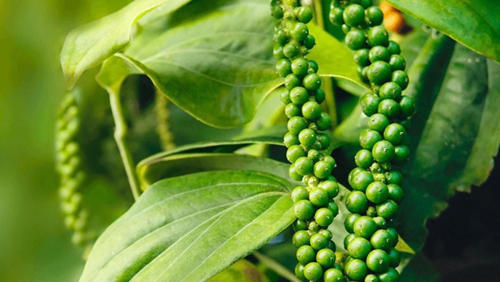This represents a 7.7% increase in volume and a 9.1% rise in value from the previous month, marking a 4.8% decline in volume and a significant 65.3% increase in value year-on-year.
    |
 |
|
Vietnam's pepper exports surpass 1 billion USD in first 10 months. (Photo: tapchicongthuong.vn) |
For the first 10 months of this year, Vietnam’s pepper exports totaled 218,732 tons, worth 1.11 billion USD, reflecting a 3% decline in volume but a 47% surge in value from the same period in 2023.
This marks the first time in a decade that pepper exports have crossed the 1 billion USD threshold, with projections for 2024 to reach a record 1.3 billion USD.
The sharp increase in export revenue is attributed to the average export price which rose 51.5% year-on-year to 5,077USD per ton during the first 10 months.
The U.S. was the largest market, accounting for 29.3% of export volume and 30.4% of revenue. Exports to the U.S. reached 64,112 tons, valued at 337.8 million USD, up 48% in volume and 95.2% in value year-on-year. Germany ranked second, with 14,346 tons worth 79.6 million USD, up 82.3% in volume and 140% in value. The UAE came third with 13,575 tons, up 35.9%. Other markets such as the Netherlands, the Republic of Korea, Russia, and Thailand also recorded double-digit growth.
Meanwhile, exports to China declined significantly, with the country dropping to sixth place, importing just 9,252 tons, a 84% drop year-on-year.
Vietnam remains the world’s leading pepper exporter, with an estimated harvest of 170,000 tons in the upcoming season. Notably, farmers are adopting organic practices to enhance productivity rather than expanding cultivation. Mixed farming, combining pepper with coffee and fruit trees, is becoming more common, improving sustainability and pest management.
Vietnam has around 200 pepper processing businesses, including 15 key exporters that control 70% of the market. The sector boasts 14 advanced processing plants and five foreign-invested companies, collectively holding 30% of the export share. High-tech factories meeting international standards such as ASTA, ESA, and JSSA turn out diverse products, including black pepper, white pepper, ground pepper, and small packaged goods.
The Comprehensive Economic Partnership Agreement (CEPA) between Vietnam and the UAE offers significant opportunities for Vietnamese pepper. The agreement eliminates tariffs on 99% of Vietnam’s exports to the UAE, opening doors for increased agricultural exports, particularly clean and organic products with Halal certification, to the UAE and the broader Middle East.
With strategic innovations and expanding global market access, Vietnam’s pepper industry is well-positioned to maintain its global leadership.
Source: VNA